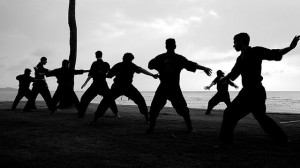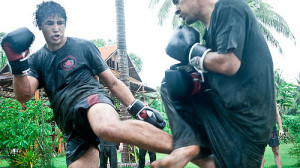 The following is a guest post. If interested in submitting a guest post, please read our guest posting policy and then contact us.
The following is a guest post. If interested in submitting a guest post, please read our guest posting policy and then contact us.
Learning martial arts has innumerable advantages. From improving your ability and defending yourself in tight situations, to providing a welcome confidence boost, the art of elegant, powerful fighting can do a great deal to change your outlook on life.
As such, it’s important to learn martial arts to the best of your abilities. Apply these seven martial arts training tips to become a better fighter, a smarter martial artist, fit, and a far more efficient student.
1. Listen to your teacher
It sounds a little obvious, doesn’t it? While it might sound silly to focus on listening to your martial arts instructor, it can be incredibly tempting to let your ego get the better of you during training. Rather than thinking you’re an expert, concede to the real master and let your teacher guide your training.
If they don’t think you’re ready just yet to learn certain moves, you aren’t.
2. Be prepared to get hurt
It takes more than a few bruises to build a champion. While you can learn how to be good at martial arts by rarely pushing yourself, it takes a dedicated student that can sustain a few injuries to truly become great.
3. Approach martial arts as a skill
Talent is something you’re born with. Skills are something that can be learned. You might not be good at martial arts from the beginning, but if you treat it like any other skill – like learning an instrument for example – you’ll make rapid progress.
4. Form Good Training Habits
There are two ways to look at mastery: as something that’s created by years of hard training, or as something that’s built day-by-day. Every day you train, visualise your goals coming together in your head and remember that you’re making progress.
By going in with a positive mental attitude, you will succeed.
5. Use video to improve your results
When you can see yourself training, all of your mistakes and lazy techniques become easy to spot. Instead of relying on the opinions of others for honest feedback, keep a video diary of your training sessions to immediately spot any technique mistakes.
6. Track your training and progress
Sometimes a little OCD can be a good thing. By keeping records of your martial arts training, you’ll be able to look back at how long it takes you to acquire skills. This is a great way to optimise your training sessions, right down to the bare essentials.
A great way to do this is to keep a log of what foods you eat, as well as when and how hard you train.
7. Surround yourself with hardworking, dedicated martial artists
If you want to become a talented fighter, you’ll get nowhere in a class of amateurs training for low-level competence. Pick the level that you wish to reach and try to surround yourself by fighters that have made it further than yourself.
You won’t get anywhere by not challenging yourself, so you need to be besieged by people that will push you.
Note: Many experts argue that when provoked, you should tell your attacker that you are trained in martial arts and will use your training to defend yourself.*
This article is a guest post written by Fightshop.com, they specialize in boxing and MMA. If interested in submitting a guest post, please read our guest posting policy and then contact us.
Photos by http://www.flickr.com/photos/49663222@N08/
I have to laugh at number two. Not because it is stupid but it is that I would never have thought to tell someone that and it seems so obvious. When I was younger I used to take karate. I think maybe for a year once a week. I think the keys I remember were to listen to the teacher, view it as a skill and form good training habits. The later when practicing is very important. You can prepare to get hurt when sparring but you cannot be prepared to get hurt because of poor training habits.
Ha! Yea I remember in the Army when we’d do Jiujitsu and some soldiers would complain about getting hurt. And like you said, a lot of it had to do with poor training habits. They just weren’t fit enough or knew just enough to be dangerous.
Watching video of myself with an instructor and getting feedback from him while we watched it was incredible. He could point to the little things I couldn’t see but being able to see myself from a 3rd person view helped tremendously.
Using video can be a HUGE help! When you’re in the middle of training, even the use of mirrors will only show you so much. Getting different angles and perspective with video can help you step back and take a comprehensive look at your movement.
Video with mirrors around sounds like a great idea. I video quite a bit of stuff for my son. We use it so he can see his mistakes. the biggest help the video has helped with is his sparring. If the main instructor is ever out. I video him to show the instructor how he was doing when he was away. In addition, we use it to post about his progress on his website. I wish we had mirrors in our dojo. It makes so much sense.
Martial arts can be useful in handing the stimuli presented externally.By attaining calmness in your mind and focusing your thoughts, you can deal clearly with the demands of life.
With the help of martial arts we become physically strong,Is it give benefit to our mind or not…..?